Ukrainian troops fight Russia tooth and nail for territory in Donetsk
Several soldiers deployed in the east of the country, where the most intense fighting is taking place to contain the Russian advance, describe their daily difficulties and demand better weapons
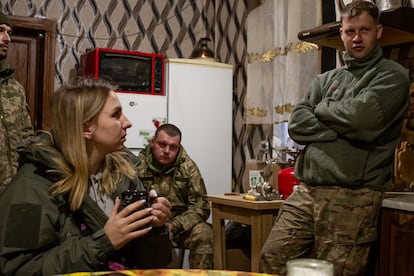

In the kitchen of a humble farmhouse in the Ukrainian countryside, Andriy Root, acting company commander of the 141st Mechanized Brigade, apologizes for the absence of infantrymen at the meeting with the journalist. “The last four who were relieved of their positions are in hospital. Wounds, concussions…” he explains. His comrades were going to report on the progress of the front line in Donetsk, the eastern Ukrainian province partially occupied by Russia, after Kremlin troops took Kurakhove earlier this year, an important node of the Ukrainian defense whose capture facilitates the Russian advance towards the west. “However, I can tell you: the situation is very difficult,” he sums up.
Besides Root, half a dozen Ukrainian soldiers live in this ramshackle house in a village in Donetsk, whose location they prefer not to reveal. It is one of many houses that were left empty after most of the region’s inhabitants fled following the Russian invasion launched almost three years ago, and which the owners usually give or rent at very low prices to the Ukrainian troops deployed there.
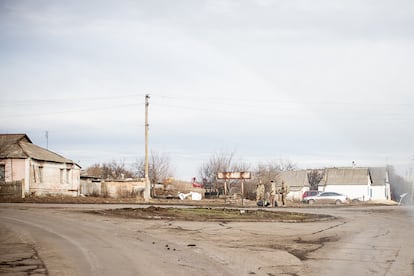
Further north, in the town of Mezhove, Eugeny “The Bulgarian,” a sergeant in the 35th Marine Infantry Brigade, echoes Root’s assessment. “We are fighting for every inch of land. The battle is very tough, because Donbas [the region in which Donetsk is located] remains Russia’s main target,” he says. The sergeant surveys the situation as he sips a steaming espresso in a café in the village, some 12 miles from Pokrovsk, another strategic town resisting siege by Moscow’s troops.
At Root’s farm, half a dozen uniformed men are standing by the stove, sharing impressions of the front they are defending near Velika Novosilka, a town that also fell into Russian hands earlier this year. The U.S.-based Institute for the Study of War (ISW) said the Kremlin is redeploying its units from Kurakhove and deploying additional forces to Pokrovsk.
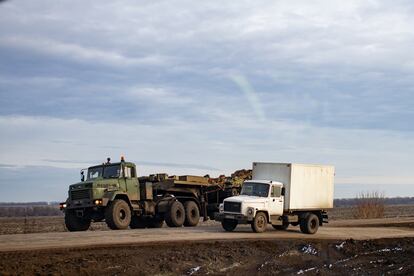
The advances in Velika Novosilka are worrying because the town is very close to Zaporizhzhia province, where the front is another of the most beleaguered areas. This region, which is mostly occupied by Russia — although not the capital — is of vital importance for the supply and communication lines between eastern and southern Ukraine. “It is impossible for us to end this war on the battlefield; Russia is far superior, it is a very unequal situation,” says Lubomir Malodobry, Root’s deputy commander.
— Is it true that Russian superiority is three men to one?
— I’d say even more, Root answers, just as The Bulgarian had a while earlier.
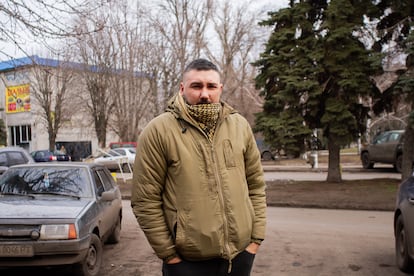
Another person present at the kitchen discussion is Dmytro, a supply vehicle driver for the 35th Brigade: “We’re defending several positions along a road that we use for logistics work. We cleared it of mines one day, and the next the Russian drones had laid new mines. They also attack with mortars,” he says. A few days ago, Dmytro managed to evacuate some comrades despite a mine explosion leaving his van without tires.
Both The Bulgarian and Root and his men note that the Russian troops find the tactic of sending small groups of infantry to take positions without being detected to be successful. “They mark a trench or armored position on the map, send two or three men there, and then two or three more. They create an assault group of 10 members and advance,” says the sergeant, who insists that Moscow does not mind sacrificing troops to take the Ukrainian defensive lines, while stressing that the enemy should not be underestimated. “They say that we are fighting against vagrants and inexperienced idiots, but Russia has more knowledge and a very strong army.” Through this tactic, Kurakhove fell in January, after being subjected to a three-month siege during which Russia first bombed it relentlessly to empty it of its civilian population. “Kurakhove is a city with tall buildings and large residential areas. When they send small groups, it is very difficult to detect them and it is pointless to use powerful weapons like Himars just to hit two enemy soldiers,” notes The Bulgarian.
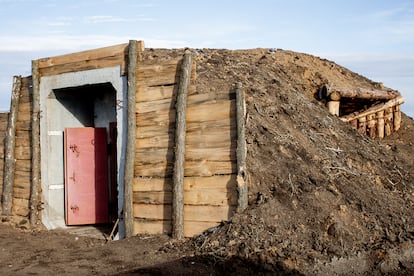
Moscow is using guided aerial bombs, a powerful device carrying between 250 and 1,500 kilograms of explosives. More than 2,000 such attacks have been documented since the beginning of 2023, killing hundreds of people and injuring thousands of civilians not only in combat zones but also in rear areas far from the front lines, according to an investigation by Truth Hounds, an organization that documents war crimes. In September 2024 alone, the Russian Armed Forces used up to 100 daily, also against civilians.
In Velika Novosilka and Pokrovsk, Russian forces have used the tactic of encirclement, as they had done before in Bakhmut and Avdiivka. “They destroy the supply routes and our guys are left without logistics and rotations, and then they will start to advance to attack them,” Root explains.
More weapons, but not just any kind
All the soldiers interviewed are clear about what is needed to stop the Russian advance: mainly weapons, but not just any kind. The Bulgarian points out that his brigade and others need shells and spare parts for their M777 howitzers. “After about 1,000 rounds, the barrel has to be changed because the accuracy drops to the point that our shells end up 400 meters from the target. How are we going to defend ourselves like that?” he asks. The accuracy of mortar ammunition depends on the configuration it comes with from the factory, and precious time is spent adapting it for use by Ukrainian forces.
The Bulgarian also points to a shortage of drones, as confirmed by Pavlo — codename Torin — commander of the 141st Brigade’s drone platoon, a light-eyed, bearded man with a spectacular handlebar mustache. “It’s a drone war and we need more of them, especially for intelligence work,” he says of the Mavic 3T models, which have a built-in thermovision system so they can be used at night.
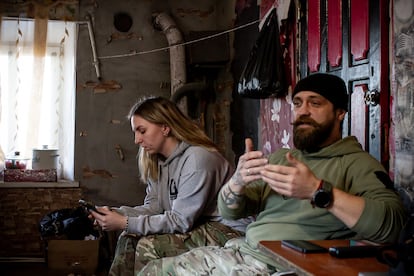
Torin lives in another farmhouse in another unnamed village on the way to Kurakhove, and from the kitchen, where a pot on the fire warms the room, he explains how these devices have changed the war. “Both sides are learning. If we come up with something new, they figure out how to deal with it,” he says. The commander has also encountered difficulties when using drones donated by different countries, each with its own factory settings that the soldiers then have to change. At best, it takes five minutes; at worst, several days, because they need to modify or add some parts that they have to buy beforehand. “Our guys configure the drones from the positions, where they have power generators and laptops,” he says.
Russia has the advantage when it comes to both artillery shells and drones, because it produces its own weapons and these are already configured to its needs, Torin explains. Although Ukraine is increasingly producing more of its own arsenal — its defense industry supplied more than 30,000 bomber drones to the army in 2024 alone — it is still dependent on foreign aid. Serhii Yeroma, spokesman for the 35th Brigade, calls on allies to send weapons not only to defend themselves, but also to reclaim lost territory. “Kharkiv was liberated because we were able to attack Russian logistics, which was further away,” he explains.
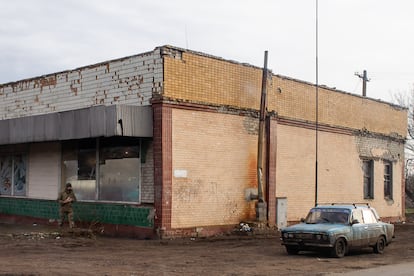
“We ask for something and our allies either don’t give it to us, or they give us something we don’t need or that isn’t enough, and they don’t deliver it on time either. If this doesn’t change, the situation won’t change,” The Bulgarian says, highlighting the failed counteroffensive in 2023. “The then-commander [Valerii] Zaluzhnyi said that in order to win he needed weapons, but no one listened to him and the counteroffensive was unsuccessful.”
End of the war?
Although more and more voices are predicting the end of the war in 2025, including Donald Trump, none of the soldiers consulted are so sure. Yulia, assistant to the commander of the 35th, poses a dilemma: “We have already lost many people. What will it have been for if we give in? But, on the other hand, if we continue, we will continue to lose more people,” she concludes in one of her brief interventions in the kitchen chat. Root laments: “Populism. From the beginning we heard: ‘Don’t worry, the war will be over in a few months.’ Then 2023, 2024 happened… And now 2025.”
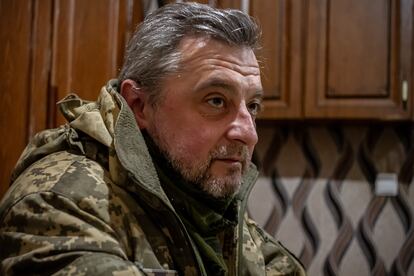
According to Malodobry, the allies must accept that Russia is not a country with which they can negotiate. “It only understands the language of force,” he says. Yeroma, for his part, expresses something that everyone agrees on: that peace will only be possible if Ukraine receives real security guarantees from its partners. “Russia still has a powerful economy and will continue to fight. It is not a good idea for them to stop the war and it is not a good idea for Ukraine to freeze the conflict without guarantees. If we freeze the conflict now, they will attack us in a few years,” he believes.
Sign up for our weekly newsletter to get more English-language news coverage from EL PAÍS USA Edition
Tu suscripción se está usando en otro dispositivo
¿Quieres añadir otro usuario a tu suscripción?
Si continúas leyendo en este dispositivo, no se podrá leer en el otro.
FlechaTu suscripción se está usando en otro dispositivo y solo puedes acceder a EL PAÍS desde un dispositivo a la vez.
Si quieres compartir tu cuenta, cambia tu suscripción a la modalidad Premium, así podrás añadir otro usuario. Cada uno accederá con su propia cuenta de email, lo que os permitirá personalizar vuestra experiencia en EL PAÍS.
¿Tienes una suscripción de empresa? Accede aquí para contratar más cuentas.
En el caso de no saber quién está usando tu cuenta, te recomendamos cambiar tu contraseña aquí.
Si decides continuar compartiendo tu cuenta, este mensaje se mostrará en tu dispositivo y en el de la otra persona que está usando tu cuenta de forma indefinida, afectando a tu experiencia de lectura. Puedes consultar aquí los términos y condiciones de la suscripción digital.








































